Minister of Foreign Affairs (Norway)
| Minister of Foreign Affairs of Norway | |
|---|---|
| Utenriksministeren | |
 | |
since 16 October 2023 | |
| Ministry of Foreign Affairs | |
| Member of | Council of State |
| Seat | Victoria Terrasse, Oslo |
| Nominator | Prime Minister |
| Appointer | Monarch With approval of Parliament |
| Term length | No fixed length |
| Constituting instrument | Constitution of Norway |
| Formation | 7 June 1905 |
| First holder | Jørgen Løvland |
| Succession | Second to Prime Minister |
| Deputy | State secretaries at the Ministry of Foreign Affairs |
| Website | Official website |
The Minister of Foreign Affairs (Bokmål: Utenriksministeren, Nynorsk: Utanriksministeren) is a councilor of state and chief of the Norway's Ministry of Foreign Affairs. Since 16 October 2023, the position has been held by Espen Barth Eide of the Labour Party.
The Ministry of Foreign Affairs, based at Victoria Terrasse, Oslo, is responsible for Norway's relation with foreign countries, including diplomacy and diplomatic missions, trade, foreign aid and cooperation with international organisations. Except during the four in which a Deputy of the Prime Minister of Norway was appointed, the Minister of Foreign Affairs ranks second in the cabinet after the Prime Minister and is his deputy.[1]
History
[edit]The position was created on 7 June 1905, the day Norway declared independence from Sweden, with the Liberal Party's Jørgen Løvland as the inaugural.[2] Forty people from five parties have held the position, all men excepting the current officeholder. From 1983 to 2013 the Minister of International Development, which was responsible for issues related to foreign aid, was attached to the Ministry of Foreign Affairs.[3]
Notable officeholders
[edit]Halvard Lange (Labour) is the longest-serving, having held the position for more than eighteen years in four cabinets. The shortest-serving is the fellow party member, Edvard Bull, Sr., who held the position for the sixteen days that Hornsrud's Cabinet lasted. Johan Ludwig Mowinckel (Liberal) was appointed four times as minister. Three people have sat concurrently as Prime Minister and Minister of Foreign Affairs: Løvland, Mowinckel and Ivar Lykke (Conservative). Three officeholders would later become Prime Minister: Løvland, Mowinckel and Kjell Magne Bondevik (Christian Democratic). Two former Prime Ministers have held the office: John Lyng (Conservative) and Thorbjørn Jagland (Labour). Trygve Lie (Labour) resigned from the office to become the inaugural Secretary-General of the United Nations. Two people have died while in office: Knut Frydenlund and Johan Jørgen Holst (both Labour).
List of ministers
[edit]The following lists the Ministers of Foreign Affairs, their party, date of assuming and leaving office, their tenure in years and days, and the cabinet they served in.
- Key
Agrarian/Centre Party
Christian Democratic Party
Conservative Party
Labour Party
Liberal Party
| Portrait | Name | Party | Took office | Left office | Tenure | Cabinet | Ref |
|---|---|---|---|---|---|---|---|
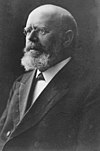
|
Jørgen Løvland | Liberal | 7 June 1905 | 19 March 1908 | 2 years, 286 days | Michelsen Løvland |
[2][4] |

|
Wilhelm Christophersen | Liberal | 19 March 1908 | 2 February 1910 | 1 year, 320 days | Knudsen I | [5] |

|
Johannes Irgens | Conservative | 2 February 1910 | 31 January 1913 | 2 years, 364 days | Konow Bratlie |
[6] |
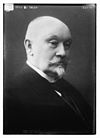
|
Nils Claus Ihlen | Liberal | 31 January 1913 | 21 June 1920 | 7 years, 142 days | Knudsen II | [7][8] |

|
Christian Fredrik Michelet | Conservative | 21 June 1920 | 22 June 1921 | 1 year, 1 day | Bahr Halvorsen I | [9] |
| Arnold C. Ræstad | Liberal | 22 June 1921 | 31 May 1922 | 343 days | Blehr II | [10] | |

|
Johan Ludwig Mowinckel | Liberal | 31 May 1922 | 6 March 1923 | 279 days | Blehr II | [10] |

|
Christian Fredrik Michelet | Conservative | 6 March 1923 | 25 July 1924 | 1 year, 141 days | Bahr Halvorsen II Berge |
[11][12] |

|
Johan Ludwig Mowinckel | Liberal | 25 July 1924 | 5 March 1926 | 1 year, 223 days | Mowinckel I | [13] |
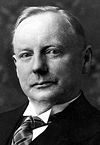
|
Ivar Lykke | Conservative | 5 March 1926 | 28 January 1928 | 1 year, 323 days | Lykke | [14] |

|
Edvard Bull, Sr. | Labour | 28 January 1928 | 15 February 1928 | 18 days | Hornsrud | [15] |

|
Johan Ludwig Mowinckel | Liberal | 15 February 1928 | 12 May 1931 | 3 years, 86 days | Mowinckel II | [16] |

|
Birger Braadland | Agrarian | 12 May 1931 | 3 March 1933 | 1 year, 295 days | Kolstad Hundseid |
[17][18] |

|
Johan Ludwig Mowinckel | Liberal | 3 March 1933 | 20 March 1935 | 2 years, 17 days | Mowinckel III | [19] |

|
Halvdan Koht | Labour | 20 March 1935 | 19 November 1940 | 5 years, 244 days | Nygaardsvold | [20] |

|
Trygve Lie | Labour | 19 November 1940 | 2 February 1946 | 5 years, 75 days | Nygaardsvold Gerhardsen I-II |
[20][21][22] |

|
Halvard Lange | Labour | 2 February 1946 | 28 August 1963 | 17 years, 207 days | Gerhardsen II Torp Gerhardsen III |
[22][23][24] |

|
Erling Wikborg | Christian Democratic | 28 August 1963 | 25 September 1963 | 28 days | Lyng | [25] |

|
Halvard Lange | Labour | 25 September 1963 | 12 October 1965 | 2 years, 17 days | Gerhardsen IV | [26] |

|
John Lyng | Conservative | 12 October 1965 | 22 May 1970 | 4 years, 222 days | Borten | [27] |

|
Svenn Stray | Conservative | 22 May 1970 | 17 March 1971 | 299 days | Borten | [27] |
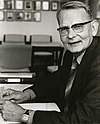
|
Andreas Cappelen | Labour | 17 March 1971 | 18 October 1972 | 1 year, 215 days | Bratteli I | [28] |
| Dagfinn Vårvik | Centre | 18 October 1972 | 16 October 1973 | 363 days | Korvald | [29] | |

|
Knut Frydenlund | Labour | 16 October 1973 | 14 October 1981 | 7 years, 363 days | Bratteli II Nordli Brundtland I |
[30][31][32] |

|
Svenn Stray | Conservative | 14 October 1981 | 9 May 1986 | 4 years, 207 days | Willoch I-II | [33] |

|
Knut Frydenlund | Labour | 9 May 1986 | 26 February 1987 | 262 days | Brundtland II | [34] |
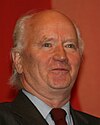
|
Thorvald Stoltenberg | Labour | 9 March 1987 | 16 October 1989 | 2 years, 221 days | Brundtland II | [34] |

|
Kjell Magne Bondevik | Christian Democratic | 16 October 1989 | 3 November 1990 | 1 year, 18 days | Syse | [35] |

|
Thorvald Stoltenberg | Labour | 3 November 1990 | 2 April 1993 | 2 years, 151 days | Brundtland III | [36] |

|
Johan Jørgen Holst | Labour | 2 April 1993 | 13 January 1994 | 286 days | Brundtland III | [36] |

|
Bjørn Tore Godal | Labour | 24 January 1994 | 17 October 1997 | 3 years, 266 days | Brundtland III Jagland |
[36][37] |

|
Knut Vollebæk | Christian Democratic | 17 October 1997 | 17 March 2000 | 2 years, 152 days | Bondevik I | [38] |

|
Thorbjørn Jagland | Labour | 17 March 2000 | 19 October 2001 | 1 year, 216 days | Stoltenberg I | [39] |

|
Jan Petersen | Conservative | 19 October 2001 | 17 October 2005 | 3 years, 363 days | Bondevik II | [40] |

|
Jonas Gahr Støre | Labour | 17 October 2005 | 21 September 2012 | 6 years, 340 days | Stoltenberg II | [41] |

|
Espen Barth Eide | Labour | 21 September 2012 | 16 October 2013 | 1 year, 25 days | Stoltenberg II | [41] |

|
Børge Brende | Conservative | 16 October 2013 | 20 October 2017 | 4 years, 4 days | Solberg | [42] |

|
Ine Eriksen Søreide | Conservative | 20 October 2017 | 14 October 2021 | 3 years, 359 days | Solberg | [43] |

|
Anniken Huitfeldt | Labour | 14 October 2021 | 16 October 2023 | 2 years, 2 days | Støre | [44] |

|
Espen Barth Eide | Labour | 16 October 2023 | present | 1 year, 71 days | Støre | [45] |
Minister of European Affairs
[edit]The Minister of European Affairs was responsible for cases related to the EEA and Norway's relation with the EU. The post was established on 16 October 2013 by the Solberg Cabinet, which at the time consisted of the Conservatives and the Progress Party. It was abolished on 17 January 2018 when the Liberals joined the Cabinet.[46]
Key
[edit]Ministers
[edit]| Portrait | Name | Party | Took office | Left office | Tenure | Cabinet |
|---|---|---|---|---|---|---|

|
Vidar Helgesen | Conservative | 16 October 2013 | 16 December 2015 | 2 years, 61 days | Solberg |

|
Elisabeth Aspaker | Conservative | 16 December 2015 | 20 December 2016 | 1 year, 4 days | Solberg |

|
Frank Bakke-Jensen | Conservative | 20 December 2016 | 20 October 2017 | 304 days | Solberg |

|
Marit Berger Røsland | Conservative | 20 October 2017 | 17 January 2018 | 89 days | Solberg |
References
[edit]- ^ "Deputy to the Norwegian Prime Minister". Government.no. 17 September 2009. Archived from the original on 6 October 2013. Retrieved 28 October 2013.
- ^ a b "Christian Michelsen's Government". Government.no. 3 December 2007. Archived from the original on 29 October 2013. Retrieved 28 October 2013.
- ^ "Solberg kutter bistandsministeren" (in Norwegian). Norwegian Broadcasting Corporation. 16 October 2013.
- ^ "Jøgen Løvland's Government". Government.no. 3 December 2007. Archived from the original on 16 October 2013. Retrieved 28 October 2013.
- ^ "Gunnar Knudsen's First Government". Government.no. 3 December 2007. Archived from the original on 29 October 2013. Retrieved 28 October 2013.
- ^ "Wollert Konow's (S.B.) Government". Government.no. 3 December 2007. Archived from the original on 29 October 2013. Retrieved 28 October 2013.
- ^ "Jens Bratlie's Government". Government.no. 14 April 2008. Archived from the original on 29 October 2013. Retrieved 28 October 2013.
- ^ "Gunnar Knudsen's Second Government". Government.no. 3 December 2007. Archived from the original on 29 October 2013. Retrieved 28 October 2013.
- ^ "Otto B. Halvorsen's First Government". Government.no. 3 December 2007. Archived from the original on 29 October 2013. Retrieved 28 October 2013.
- ^ a b "Otto Blehr's Second Government". Government.no. 3 December 2007. Archived from the original on 20 October 2013. Retrieved 28 October 2013.
- ^ "Otto B. Halvorsen's Second Government". Government.no. 3 December 2007. Archived from the original on 17 October 2013. Retrieved 28 October 2013.
- ^ "Abraham Berge's Second Government". Government.no. 3 December 2007. Archived from the original on 29 October 2013. Retrieved 28 October 2013.
- ^ "Johan Ludwig Mowinckel's First Government". Government.no. 3 December 2007. Archived from the original on 20 October 2013. Retrieved 28 October 2013.
- ^ "Ivar Lykke's Government". Government.no. 3 December 2007. Archived from the original on 29 October 2013. Retrieved 28 October 2013.
- ^ "Christopher Hornsrud's Government". Government.no. 3 December 2007. Archived from the original on 20 October 2013. Retrieved 28 October 2013.
- ^ "Johan Ludwig Mowinckel's Second Government". Government.no. 3 December 2007. Archived from the original on 29 October 2013. Retrieved 28 October 2013.
- ^ "Peder Kolstad's Government". Government.no. 3 December 2007. Archived from the original on 17 October 2013. Retrieved 28 October 2013.
- ^ "Jens Hundseid's Government". Government.no. 3 December 2007. Archived from the original on 29 October 2013. Retrieved 28 October 2013.
- ^ "Johan Ludwig Mowinckel's Third Government". Government.no. 3 December 2007. Archived from the original on 29 October 2013. Retrieved 28 October 2013.
- ^ a b "Johan Nygaardsvoll's Government". Government.no. 12 December 2006. Archived from the original on 28 September 2013. Retrieved 28 October 2013.
- ^ "Einar Gerhardsen's First Government". Government.no. 12 December 2006. Archived from the original on 30 September 2013. Retrieved 28 October 2013.
- ^ a b "Einar Gerhardsen's Second Government". Government.no. 12 December 2006. Archived from the original on 8 October 2012. Retrieved 23 March 2012.
- ^ "Oscar Torp's Government". Government.no. 12 December 2006. Archived from the original on 10 October 2012. Retrieved 23 March 2012.
- ^ "Einar Gerhardsen's Third Government". Government.no. 12 December 2006. Archived from the original on 29 March 2012. Retrieved 23 March 2012.
- ^ "John Lyng's Government". Government.no. 12 December 2006. Archived from the original on 10 October 2012. Retrieved 23 March 2012.
- ^ "Einar Gerhardsen's Fourth Government". Government.no. 12 December 2006. Archived from the original on 10 October 2012. Retrieved 23 March 2012.
- ^ a b "Per Borten's Government". Government.no. 12 December 2006. Archived from the original on 9 October 2012. Retrieved 23 March 2012.
- ^ "Trygve Bratteli's First Government". Government.no. 12 December 2006. Archived from the original on 9 October 2012. Retrieved 23 March 2012.
- ^ "Lars Korvald's Government". Government.no. 12 December 2006. Archived from the original on 5 October 2012. Retrieved 23 March 2012.
- ^ "Trygve Bratteli's Second Government". Government.no. 12 December 2006. Archived from the original on 9 October 2012. Retrieved 23 March 2012.
- ^ "Odvar Nordli's Government". Government.no. 12 December 2006. Archived from the original on 5 October 2012. Retrieved 23 March 2012.
- ^ "Gro Harlem Brundtland's First Government". Government.no. 12 December 2006. Archived from the original on 5 October 2012. Retrieved 23 March 2012.
- ^ "Odvar Nordli's Government". Government.no. 12 December 2006. Archived from the original on 5 October 2012. Retrieved 23 March 2012.
- ^ a b "Gro Harlem Brundtland's Second Government". Government.no. 12 December 2006. Archived from the original on 29 March 2012. Retrieved 23 March 2012.
- ^ "Jan Syse's Government". Government.no. 12 December 2006. Archived from the original on 5 October 2012. Retrieved 23 March 2012.
- ^ a b c "Gro Harlem Brundtland's Third Government". Government.no. 12 December 2006. Archived from the original on 3 October 2012. Retrieved 23 March 2012.
- ^ "Thorbjørn Jagland's Government". Government.no. 12 December 2006. Archived from the original on 31 July 2012. Retrieved 23 March 2012.
- ^ "Kjell Magne Bondevik's First Government". Government.no. 12 December 2006. Archived from the original on 5 October 2012. Retrieved 23 March 2012.
- ^ "Jens Stoltenberg's First Government". Government.no. 13 December 2006. Archived from the original on 31 July 2012. Retrieved 23 March 2012.
- ^ "Kjell Magne Bondevik's Second Government". Government.no. 13 December 2006. Archived from the original on 29 March 2012. Retrieved 23 March 2012.
- ^ a b "Jens Stoltenberg's Second Government". Government.no. 15 February 2008. Archived from the original on 11 April 2012. Retrieved 23 March 2012.
- ^ "Erna Solberg's Government". Government.no. 16 October 2013. Retrieved 23 October 2013.
- ^ "Tre bytter i Regjeringen – Ine Eriksen Søreide første kvinnelige utenriksminister" (in Norwegian). Aftenposten. 20 October 2017. Retrieved 20 October 2017.
- ^ "Norge har fått ny regjering" (in Norwegian). NRK. 14 October 2021. Retrieved 14 October 2021.
- ^ "Her er Støre sine nye statsrådar" (in Norwegian Nynorsk). NRK. 16 October 2023. Retrieved 16 October 2023.
- ^ "New Cabinet Without the EU Minister" (in Norwegian). Sunmørsposten. 17 January 2018. Retrieved 7 February 2020.
External links
[edit] Media related to Ministers of Foreign Affairs of Norway at Wikimedia Commons
Media related to Ministers of Foreign Affairs of Norway at Wikimedia Commons

